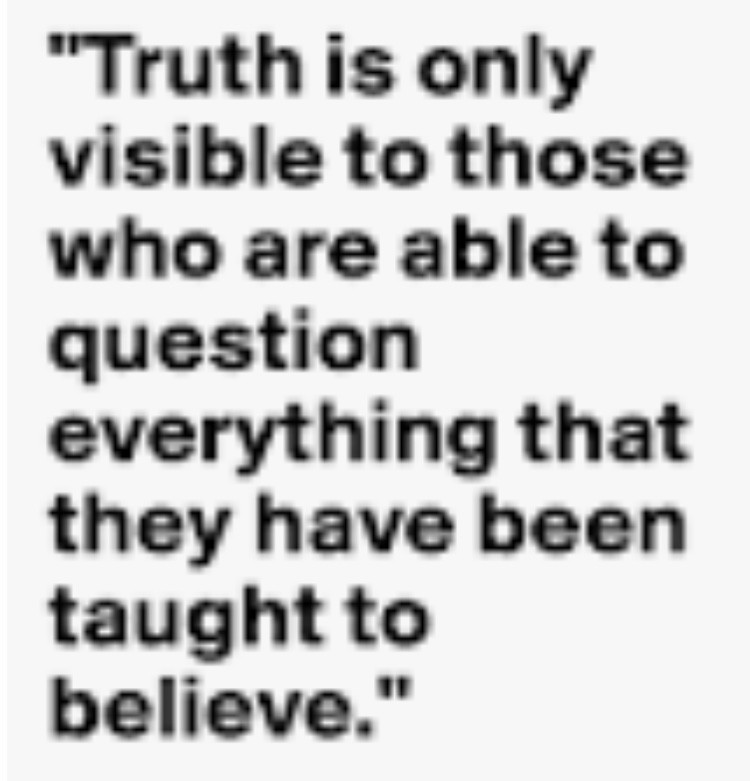The Best Is Yet To Come!
@TheBestIsYetToCome
07 July, 06:30
Notice: Undefined index: tg1tga_access in /home/admin/www/anonup.com/themes/default/apps/timeline/post.phtml on line 396
Devid Weilder
@loichtfoier
07 July, 07:11
In response The Best Is Yet To Come! to his Publication
Truth is a relative concept, i.e. related to the respective point of view. It's not a valuation of essential correctness. According to the definition truth is: "The agreement of a statement with a thing about which it is made". With the term "truth" one establishes only the validity of a circumstance as it exists in itself to the status quo. Whether this truth is good or bad only plays a role on a completely different level. Example: "Peace is more reasonable than war" is just as true as saying: "The more bullets I fire, the faster someone is dead". The action is morally wrong, but the statement is valid as truth.
So it is a matter of finding the truth that is right according to the social codex. In the above example, for good people the second statement is invalid, the first is valid, but true they both are. Perhaps the corresponding value statement has a much better penetrating power. To say: "This is untrue!" does not hit it as exactly as: "That is not a valid truth!"
🔑
So it is a matter of finding the truth that is right according to the social codex. In the above example, for good people the second statement is invalid, the first is valid, but true they both are. Perhaps the corresponding value statement has a much better penetrating power. To say: "This is untrue!" does not hit it as exactly as: "That is not a valid truth!"
🔑
Notice: Undefined index: tg1tga_access in /home/admin/www/anonup.com/themes/default/apps/timeline/post.phtml on line 396
The Best Is Yet To Come!
@TheBestIsYetToCome
07 July, 07:25
In response Devid Weilder to his Publication
Thank you for your response. I couldnt find a definition of “Truth” that matched your definition. I searched many other definitions than the ones below but most came up with similar definition as these.
1a(1) : the body of real things, events, and facts : ACTUALITY
(2) : the state of being the case : FACT
(3) often capitalized : a transcendent fundamental or spiritual reality
b : a judgment, proposition, or idea that is true or accepted as true
truths of thermodynamics
c : the body of true statements and propositions
2a : the property (as of a statement) of being in accord with fact or reality
b chiefly British : TRUE sense 2
c : fidelity to an original or to a standard
3a : sincerity in action, character, and utterance
b archaic : FIDELITY, CONSTANCY
4 capitalized, Christian Science : GOD
in truth
: in accordance with fact : ACTUALLY
1a(1) : the body of real things, events, and facts : ACTUALITY
(2) : the state of being the case : FACT
(3) often capitalized : a transcendent fundamental or spiritual reality
b : a judgment, proposition, or idea that is true or accepted as true
truths of thermodynamics
c : the body of true statements and propositions
2a : the property (as of a statement) of being in accord with fact or reality
b chiefly British : TRUE sense 2
c : fidelity to an original or to a standard
3a : sincerity in action, character, and utterance
b archaic : FIDELITY, CONSTANCY
4 capitalized, Christian Science : GOD
in truth
: in accordance with fact : ACTUALLY
Notice: Undefined index: tg1tga_access in /home/admin/www/anonup.com/themes/default/apps/timeline/post.phtml on line 396
The derivation is already correct. It's not always easy to reduce your today's languages to their factuality. Đëotış (Deutsch/German) and Ængléş (English) are no longer what they once were. Looking at English, very many words are completely out of context. The German 'Wahr' (from: Ɣār) is translated into 'true', but the đёot.: "trú" says more "gültig", which becomes English 'valid', which originally meant much more "reliable".
Just the idiomatic 'Ængléş' would need a lot of correction. It's not easy for someone like me to write 'this' English here. Of course, not everything is correct in German anymore either. Example "Gift", which is a present, but in German: "Gift", means "poison". We assume, because with poisoned gifts (fruits) one often eliminated his opponents. There are other examples.
So if you want to understand today's languages better, Google and Youtube will not help you. You must already make an effort yourself, must not trivially take over everything from there.
🌱
Just the idiomatic 'Ængléş' would need a lot of correction. It's not easy for someone like me to write 'this' English here. Of course, not everything is correct in German anymore either. Example "Gift", which is a present, but in German: "Gift", means "poison". We assume, because with poisoned gifts (fruits) one often eliminated his opponents. There are other examples.
So if you want to understand today's languages better, Google and Youtube will not help you. You must already make an effort yourself, must not trivially take over everything from there.
🌱
03:43 AM - Jul 08, 2021
In response The Best Is Yet To Come! to his Publication
Only people mentioned by loichtfoier in this post can reply

